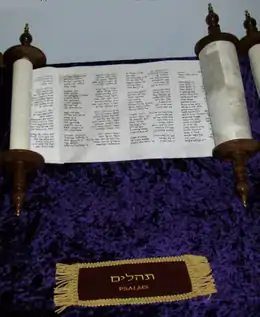Psalm 146
Psalm 146 is the 146th psalm of the biblical Book of Psalms. In the Greek Septuagint version of the bible, and in its Latin translation in the Vulgate, this psalm is Psalm 145 in a slightly different numbering system.
| Psalm 146 | |
|---|---|
 Scroll of the Psalms | |
| Book | Book of Psalms |
| Hebrew Bible part | Ketuvim |
| Order in the Hebrew part | 1 |
| Category | Sifrei Emet |
| Christian Bible part | Old Testament |
| Order in the Christian part | 19 |
Psalm 146 is the first of 5 final concluding praise Psalms in the Psalter. Psalm 146 and 147 are seen by some as twin Psalms.[1] Both psalms draw on images from Isaiah 61, (which Jesus takes as applying to himself in Luke 4), such as setting captives free and opening blind eyes in Psalm 147 and healing the brokenhearted in Psalm 148. Besides Isaiah 61, the themes in this Psalm are also found on Leviticus 25 (the year of Jubilee).
This is one of 6 Psalms involving preaching to self, with the evocative phrase the phrase "O my soul" is used. Psalms 42, 43, 103, 104, 116 and 146. Preaching to self was highly recommended by Martyn Loyd Jones as he said “Have you realized that most of your unhappiness in life is due to the fact that you are listening to yourself instead of talking to yourself?"
Uses

Judaism
- The psalm in its entirety is recited during Pesukei Dezimra, the initial section of the daily morning prayer service.[2]
- The blessings Pokeiakh Ivrim ("gives sight to the blind"), Matir asurim ("releases the bound"), Zokef kefufim ("straightens the bent"), from the Birkat HaShachar are derived from Psalm 146:7-8.[3]
- Verse 10 is part of Kedusha,[4] and is a part of the third blessing of the High Holidays Amidah.[5]
Christianity
- Verse 6 is quoted in the New Testament in Acts 4:24; Acts 14:15[6]
- Since the Middle Ages, this psalm was recited or sung during the vespers office on Thursday, according to the Rule of St. Benedict, established in 530 AD.[7][8] In the modern Roman Catholic Liturgy of the Hours, Psalm 139 is recited at Vespers, and also Wednesday's fourth week.[9] In the liturgy of the Mass, it is played or sung for the feast of St. John the Baptist.
References
- The End of the Psalter: Psalms 146-150 in the Masoretic Text, the Dead Sea Scrolls, and the Septuagint by Alma Brodersen - 2017
- The Complete Artscroll Siddur page 70
- The Complete Artscroll Siddur page 18
- The Complete Artscroll Siddur page 100
- The Complete Artscroll Machzor for Rosh Hashanah page 67
- Kirkpatrick, A. F. (1901). The Book of Psalms: with Introduction and Notes. The Cambridge Bible for Schools and Colleges. Book IV and V: Psalms XC-CL. Cambridge: At the University Press. p. 840. Retrieved February 28, 2019.
- Prosper Guéranger, Règle de saint Benoît, (traduction de Prosper Guéranger, réimpressin 2007)
- Psautier latin-français du bréviaire monastique, 1938/2003 p 519.
- The main cycle of liturgical prayers takes place over four weeks.
External links
| Wikimedia Commons has media related to Psalm 146. |